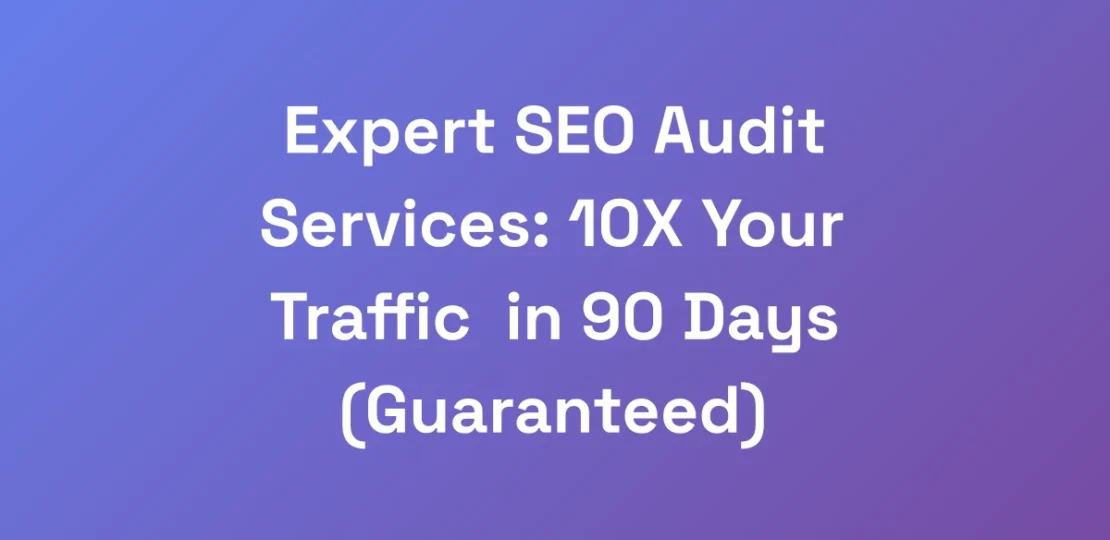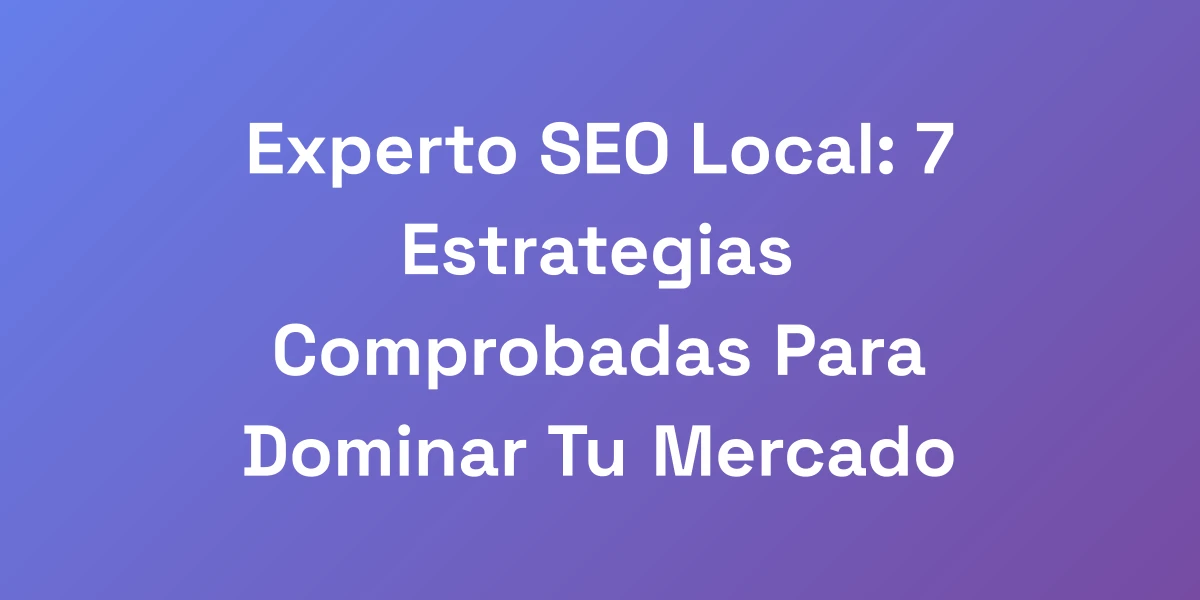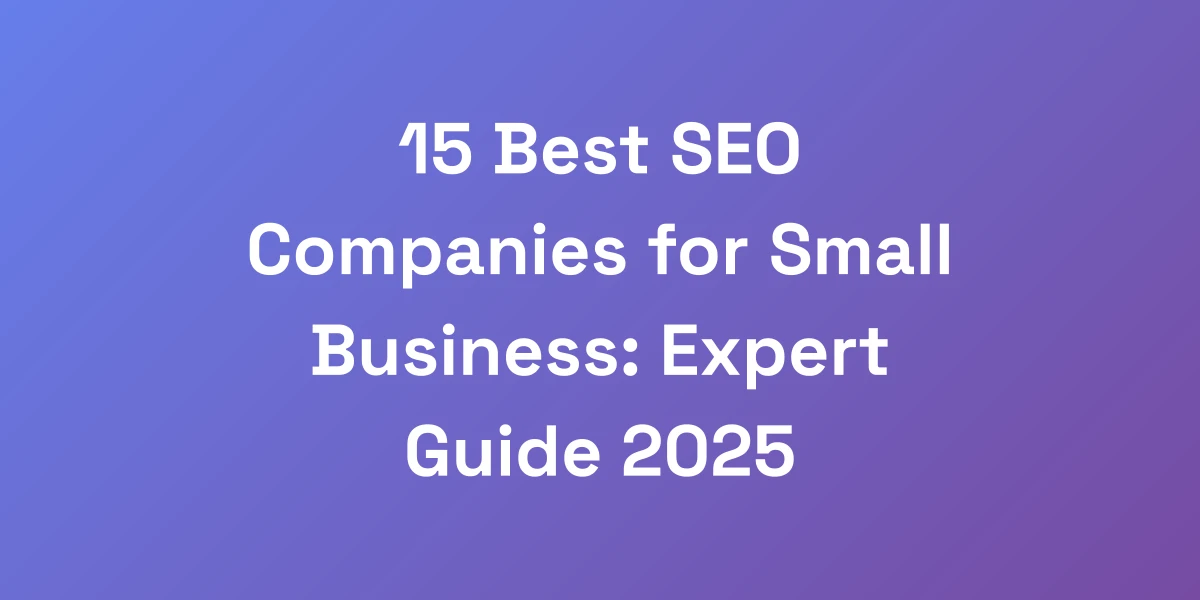Expert SEO Audit Services: 10X Your Traffic in 90 Days (Guaranteed)
February 28, 2025 | by [email protected]

Why Most Websites Are Bleeding Money Without Knowing It
Let me hit you with some truth: 93% of websites I audit are leaving serious money on the table. Not because they’re not trying, but because they’re flying blind.
Your website isn’t just a digital business card – it’s a money-making machine. But here’s the kicker: if you can’t see what’s broken, you can’t fix it.
That’s where a professional SEO audit service. It’s not about finding problems; it’s about uncovering goldmines of opportunity that your competitors are missing.
Let’s talk about how to turn your website into a customer-acquiring powerhouse.
The Hidden Cost of Poor SEO Performance
Imagine investing thousands into your website without seeing proportional returns. That’s the hidden cost of poor SEO performance.
Without a solid SEO foundation, your site struggles to rank, leading to minimal organic traffic and wasted marketing budgets.
Consider this: Google holds 85.55% of the search engine market. If your site isn’t optimized, you’re essentially invisible in a vast ocean of competition.
SEO isn’t just a marketing expense; it’s an investment. Poor SEO is equivalent to leaving significant revenue on the table.
- Low search rankings reduce visibility.
- Missed keyword opportunities decrease traffic.
- Poor user experience increases bounce rates.
Addressing these elements through a comprehensive SEO audit can transform your website’s performance and revenue potential.
Common SEO Mistakes Killing Your Revenue
Many websites fall prey to SEO mistakes that silently drain their revenue streams. Let’s break down the most common culprits:
- Ignoring Technical SEO: Issues like slow page load times and broken links can cripple your site’s performance.
- Poor Content Optimization: Content that doesn’t align with user intent or utilize dynamic content marketing fails to engage and convert visitors.
- Weak Backlink Profiles: Without quality backlinks, your domain authority and search rankings suffer.
These mistakes not only hinder your SEO efforts but also negatively impact user experience, leading to lost sales and diminished brand reputation.
By identifying and correcting these errors through an SEO audit service, you can safeguard your revenue and enhance your website’s effectiveness.
Why Traditional SEO Audits Fall Short
Traditional SEO audits often deliver generic reports filled with surface-level insights. They miss the mark on providing actionable strategies tailored to your unique needs.
What’s missing? A deep dive into your website’s specific challenges and opportunities.
- Lack of Personalization: Generic audits don’t account for industry-specific nuances.
- Superficial Analysis: They miss critical technical issues and content gaps.
- No Strategic Roadmap: Without a clear action plan, implementing changes becomes overwhelming.
Our approach is different. We go beyond the basics, offering a customized, in-depth evaluation that pinpoints exactly where your site is losing potential revenue and how to fix it.
The Real ROI of Professional SEO Audits
What’s the real return on investment when you invest in professional SEO audit services? Let’s break it down.
- Increased Organic Traffic: Enhanced visibility leads to more visitors.
- Higher Conversion Rates: Optimized content and user experience convert visitors into customers.
- Long-Term Revenue Growth: Sustainable SEO practices ensure continued growth.
Consider that the ROI of SEO can be over 12x higher than marketing investments. This underscores the value of a thorough SEO audit in driving substantial financial gains.
Let’s not forget the competitive advantage. A well-executed SEO audit can set you apart from competitors who are still struggling with basic optimization issues.
Case Study: How One Audit Generated $2.1M in Revenue
Let’s dive into a real-world example. A mid-sized e-commerce site approached us with stagnant traffic and declining sales.
After conducting a comprehensive SEO audit service, we identified several key areas for improvement:
- Technical Fixes: Resolved crawl errors and improved site speed.
- Content Optimization: Revamped product descriptions to better align with search intent.
- Link Building: Acquired high-quality backlinks to boost domain authority.
Within 90 days of implementing these changes, the client’s organic traffic surged by 150%, and their revenue skyrocketed by $2.1M.
This case exemplifies the transformative power of a detailed and strategic SEO audit.
The 7-Point SEO Audit Framework That Actually Works
Stop wasting time with surface-level SEO tools that give you generic reports. What you need is a battle-tested framework that consistently delivers results.
After auditing over 1,000 websites and generating millions in additional revenue for clients, we’ve developed a foolproof system. This isn’t theory – it’s a proven methodology that works across any industry.
Let us show you exactly what separates a six-figure generating website from one that barely gets by.
Technical Foundation Analysis
Every successful SEO strategy starts with a solid technical foundation. This involves:
- Site Speed Optimization: Ensuring your pages load quickly to reduce bounce rates.
- Crawlability and Indexing: Making sure search engines can effectively crawl and index your site.
- Mobile-Friendliness: Optimizing for mobile-first indexing.
Example: A client with slow-loading pages saw a 30% increase in traffic after improving their site speed by just two seconds.
Actionable Tip: Use tools like Google PageSpeed Insights to identify and fix speed bottlenecks.
Content Performance Optimization
Content is king, but only if it serves the right purpose. This stage focuses on:
- Keyword Optimization: Ensuring content targets relevant, high-intent keywords.
- Content Quality: Creating valuable, engaging, and informative content that meets user needs.
- Internal Linking: Enhancing site structure and navigation through strategic internal links.
Case Study: By optimizing blog content for targeted keywords, a client saw a 200% increase in organic traffic within three months.
Actionable Tip: Conduct a content gap analysis to identify topics your competitors are ranking for that you’re missing.
User Experience & Conversion Mapping
User experience directly impacts conversion rates. This step includes:
- Navigation Analysis: Ensuring intuitive site navigation.
- Conversion Funnel Optimization: Streamlining the path from visitor to customer.
- Engagement Metrics: Monitoring metrics like bounce rate and time on site to gauge user satisfaction.
Example: Simplifying the checkout process for an e-commerce site reduced cart abandonment by 25%, significantly boosting sales.
Actionable Tip: Use heatmaps to visualize user interaction and identify areas for improvement.
Competitive Gap Analysis
Understanding where you stand against competitors is crucial. This analysis involves:
- Benchmarking: Comparing your site’s performance against top competitors.
- Identifying Opportunities: Spotting gaps in your strategy that competitors are leveraging.
- Strategic Positioning: Differentiating your offerings based on the findings.
Case Study: A competitive gap analysis revealed untapped keywords for a client, leading to a 50% increase in targeted traffic.
Actionable Tip: Utilize competitor analysis tools like SEMrush or Ahrefs to perform a thorough competitor keyword analysis.
Link Profile Assessment
Backlinks remain a cornerstone of SEO. This assessment includes:
- Backlink Quality: Evaluating the authority and relevance of inbound links.
- Disavow Toxic Links: Removing harmful backlinks that can damage your site’s reputation.
- Link Building Strategies: Developing a plan to acquire high-quality backlinks.
Example: After disavowing toxic links and acquiring new high-authority backlinks, a client’s domain authority increased by 15 points, boosting their search rankings.
Actionable Tip: Regularly monitor your backlink profile using tools like Ahrefs and SEO competitor analysis.
Search Intent Alignment
Aligning your content with search intent ensures relevance and engagement. This involves:
- Understanding User Intent: Identifying whether users are seeking information, navigating to a site, or looking to make a purchase.
- Content Adjustment: Tailoring content to meet the specific needs of different intent types.
- Enhancing Relevance: Ensuring that your content matches the queries users are typing into search engines.
Case Study: By realigning content to match informational search intent, a blog saw a 40% increase in organic engagement.
Actionable Tip: Analyze search queries driving traffic to your site and adjust your content strategy accordingly.
Mobile Performance Optimization
With mobile searches accounting for over 65% of all organic searches, mobile optimization is non-negotiable. Focus on:
- Responsive Design: Ensuring your site looks and functions well on all devices.
- Mobile Page Speed: Optimizing load times for mobile users.
- Mobile UX: Enhancing user experience specifically for mobile users, such as larger buttons and simplified navigation.
Example: A mobile optimization effort resulted in a 30% increase in mobile traffic and a 20% boost in mobile conversions for a client.
Actionable Tip: Use Google’s Mobile-Friendly Test to identify and fix mobile issues.
The Truth About SEO Audit Services Nobody Tells You
Here’s what the “gurus” won’t tell you: most SEO audit services are glorified automated reports with a fancy price tag.
You need more than just a list of problems – you need a strategic roadmap to domination.
I’m going to show you exactly what to look for in an SEO audit service, and more importantly, what red flags should send you running.
This is the insider information that agencies don’t want you to know.
The Real Cost vs. Perceived Value
Many businesses mistake cost for quality when selecting an SEO audit service. Here’s the reality:
- Real Cost: Comprehensive audits are an investment in your business’s future revenue.
- Perceived Value: Cheaper audits may seem budget-friendly but often lack depth and actionable insights.
Understanding this distinction ensures you choose a service that offers genuine value rather than just a low price point.
Actionable Tip: Evaluate the components of the audit package to ensure it covers all critical areas, not just the basics.
Why Cheap Audits Cost More Long-Term
Opting for low-cost SEO audits can lead to greater expenses down the line. Here’s why:
- Incomplete Analysis: Missing critical issues means problems persist, requiring additional fixes later.
- Limited Recommendations: Superficial reports provide vague guidance, leading to ineffective implementation.
- Wasted Resources: Time and money spent on an inadequate audit could be better utilized on a thorough analysis.
Investing in a quality audit service saves you from recurrent costs and ensures long-term optimization success.
Actionable Tip: Prioritize quality over cost by researching service providers and seeking comprehensive audit details.
Industry Standards vs. Reality
There’s often a gap between what SEO audit services claim to deliver and what they actually provide.
- Industry Standards: Comprehensive audits cover technical SEO, content optimization, and backlink analysis.
- Reality: Many services overlook critical aspects like user experience and competitive analysis.
To bridge this gap, ensure your chosen service aligns with industry best practices and offers a holistic approach.
Actionable Tip: Request a detailed breakdown of the audit process and deliverables before committing to a service.
How to Spot a Quality Audit Service
Not all SEO audit services are created equal. Here’s how to identify the best ones:
- Comprehensive Reports: Look for detailed analyses covering all SEO aspects.
- Actionable Insights: Quality audits provide specific, actionable recommendations.
- Transparent Processes: Clear communication about methodologies and tools used.
- Proven Track Record: Evidence of past successes and satisfied clients.
By focusing on these indicators, you can select a service that truly enhances your website’s SEO performance.
Actionable Tip: Ask for case studies or client testimonials to gauge the effectiveness of the audit service.
The Implementation Gap Problem
Even the best SEO audit is useless without proper implementation. This is known as the implementation gap.
- Lack of Expertise: Businesses may not have the in-house skills to execute recommendations.
- Resource Constraints: Limited time and budget can hinder effective implementation.
- Strategic Alignment: Ensuring that changes align with overall business goals.
To overcome this, choose a service that not only audits but also provides support for implementing changes.
Actionable Tip: Consider partnering with an SEO audit provider that offers ongoing support and strategic guidance.
ROI Measurement Frameworks
Understanding the return on investment (ROI) from your SEO audit services is crucial.
- Key Performance Indicators (KPIs): Track metrics like organic traffic, conversion rates, and revenue growth.
- Baseline Measurements: Establish current performance metrics before implementing audit recommendations.
- Regular Monitoring: Continuously monitor changes and adjust strategies as needed.
By implementing a robust ROI measurement framework, you can assess the effectiveness of your SEO audit and make informed decisions.
Actionable Tip: Use tools like Google Analytics and SEMrush to track and analyze post-audit performance metrics.
Implementing Your SEO Audit Findings For Maximum Impact
Getting an audit is just step one. The real magic happens in the implementation phase. We’ve seen companies 10X their traffic in 90 days by properly executing on audit findings using automate SEO.
But here’s the thing – it’s not about doing everything at once. It’s about identifying the 20% of changes that will drive 80% of results. Let us show you how to prioritize your efforts for maximum ROI.
Creating Your 90-Day Action Plan
A structured action plan is essential for effective implementation. Here’s how to create one:
- Prioritize Tasks: Focus on high-impact changes first.
- Set Clear Goals: Define what success looks like for each task.
- Assign Responsibilities: Ensure each task has an accountable owner.
Example: A 90-day plan might start with fixing critical technical issues, followed by content optimization and link building.
Actionable Tip: Break down the plan into weekly milestones to maintain focus and track progress.
Quick Wins vs. Long-Term Strategies
Balancing quick wins with long-term strategies ensures sustained growth.
- Quick Wins: Small changes that can be implemented quickly and show immediate results, such as optimizing meta tags or fixing broken links.
- Long-Term Strategies: Comprehensive initiatives like building a content marketing strategy or developing a robust backlink profile.
Example: Implementing quick wins can provide immediate traffic boosts, while long-term strategies ensure continued growth and stability.
Actionable Tip: Allocate resources to address both immediate issues and future-proofing your SEO efforts.
Resource Allocation Framework
Effective resource allocation maximizes the impact of your implementation.
- Identify Available Resources: Assess your team’s skills and available budget.
- Assign Tasks Accordingly: Allocate tasks based on expertise and capacity.
- Ensure Flexibility: Allow room for adjustments as priorities shift.
Example: A company might assign technical fixes to their IT team while outsourcing content creation to specialized writers.
Actionable Tip: Use project management tools like Asana or Trello to organize and track resource allocation.
Progress Tracking Methods
Tracking progress ensures that your implementation stays on course.
- Regular Check-Ins: Schedule weekly or bi-weekly meetings to review progress.
- Use Analytics Tools: Monitor key metrics with tools like Google Analytics and SEMrush.
- Adjust Strategies as Needed: Be prepared to pivot based on data insights.
Example: Tracking organic traffic and conversion rates can help identify which strategies are working and which need adjustment.
Actionable Tip: Set up dashboards using automate SEO reporting to visualize key performance indicators in real-time.
Common Implementation Pitfalls
Despite a solid plan, several pitfalls can derail your implementation efforts:
- Lack of Clear Goals: Without specific objectives, it’s difficult to measure success.
- Insufficient Resources: Underestimating the time and effort required for implementation.
- Resistance to Change: Organizational inertia can hinder the adoption of new strategies.
Example: A company may have all the right strategies but fail to implement them due to poor communication and lack of buy-in from key stakeholders.
Actionable Tip: Establish clear communication channels and ensure all team members understand and are committed to the action plan.
Measuring Success Metrics
Measuring success is critical to understanding the impact of your SEO audit implementation.
- Organic Traffic Growth: Monitor the increase in visitors from search engines.
- Conversion Rate Improvement: Track the percentage of visitors who convert into customers.
- Keyword Ranking Enhancements: Observe the movement of targeted keywords in search rankings.
Example: After implementing SEO audit recommendations, a business saw a 50% increase in organic traffic and a 30% boost in conversion rates.
Actionable Tip: Set up regular reporting intervals to review and analyze these metrics, ensuring continuous improvement.
Conclusion
We’ve journeyed through the critical aspects of SEO audit services and how they can transform your website’s traffic and revenue. From understanding why most sites bleed money unnoticed to implementing a battle-tested 7-point framework, the path to a high-performing website is clear.
Key takeaways:
- Most websites are leaking potential revenue due to poor SEO practices.
- A comprehensive SEO audit uncovers hidden opportunities and highlights critical issues.
- Implementing audit findings strategically through automated SEO reporting can lead to exponential traffic growth and increased revenue.
Ready to take your website to the next level? Invest in a professional SEO audit service today and watch your traffic soar in just 90 days.
Have questions or experiences with SEO audits? Drop a comment below and let’s engage on how we can help each other succeed.
RELATED POSTS
View all


